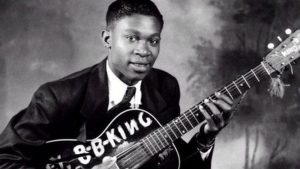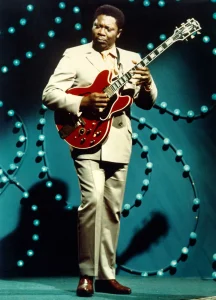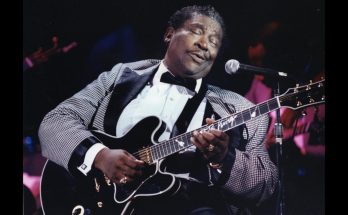B.B. King: The Soul of the Blues, From the Delta to the World
The blues don’t come much bigger than B.B. King. Born in a shack on the Mississippi Delta, he clawed his way from cotton fields to global stages, guitar in hand, a voice like gravel and honey, and a story that could break your heart or lift it to the rafters. Riley B. King wasn’t just a man—he was a force, a preacher of six-string gospel, and the heartbeat of a genre that’s carried the weight of the world. Let’s roll through his life, his sound, and why, even now, he’s the king who still reigns.

Young Years: A Boy in the Delta Dirt
September 16, 1925. Berclair, Mississippi. Riley comes into the world on a plantation, son of sharecroppers Albert and Nora Ella King. Life’s brutal—his folks split when he’s four, his mama dies when he’s nine, and by ten, he’s an orphan living with his grandma, picking cotton for pennies. But there’s music in the air: church hymns, field hollers, the wail of a slide guitar from a neighbor’s porch. He gets his first taste strumming a one-string diddley bow—wire nailed to a wall—and soon a preacher cousin hands him a real guitar. That’s it. The blues grabs him young and never lets go.
He sings in church, soaking up gospel’s fire, but it’s the street corner players—guys like Blind Lemon Jefferson on scratchy records—that light the fuse. By his teens, he’s hitchhiking to Indianola, busking for change, dreaming of something bigger than the Delta’s endless rows.
Delta Years: Finding His Voice
The 1940s are B.B.’s proving ground. He’s a tractor driver by day, a picker of cotton and dreams, but music’s his escape. He’s glued to the radio—Sonny Boy Williamson’s King Biscuit Time out of Helena, Arkansas, spinning T-Bone Walker’s electric growl and Lonnie Johnson’s smooth licks. B.B.’s got a guitar now, a cheap acoustic, and he’s mimicking what he hears, bending notes till they cry like he feels inside.
Then comes the twist: 1948, Memphis. He bolts from the plantation after a tractor mishap, lands in the Beale Street bustle, and talks his way onto Williamson’s radio show. One song, live, and he’s hooked. He’s “Blues Boy” King now—B.B. for short—spinning discs as a DJ while gigging juke joints at night. It’s here he names his guitar Lucille after that fiery night in Twist (you know the tale: dance hall blaze, a woman worth risking it all for). The Delta’s in his bones, but Memphis is where he starts to roar.

Chicago Years: Electric Soul Takes Flight
By the 1950s, B.B.’s chasing the big time. Chicago’s the blues capital—Chess Records, Muddy Waters, Howlin’ Wolf—and he’s ready to plug in. He trades the acoustic for a Gibson semi-hollow, cranks the amp, and lets Lucille sing. His first hit, “3 O’Clock Blues” (1951), climbs the R&B charts, and suddenly he’s touring nonstop—300 nights a year, Black clubs across the South and Midwest, the “Chitlin’ Circuit.” Sweat-soaked, relentless, he’s building a name.
Chicago’s where he hones that sound: single-note runs, fat with vibrato, less chords, more feeling. He’s not shredding like some—he’s preaching, every bend a sermon. Hits pile up—“You Upset Me Baby,” “Every Day I Have the Blues”—and by the ’60s, he’s crossing over. White audiences catch wind, especially after “The Thrill Is Gone” (1969) goes gold. That mournful minor-key masterpiece, with Lucille weeping over strings, makes him a household name.
The Music: A Sound Like No Other
B.B.’s music is the blues boiled down to its essence—raw, direct, human. He pulls from gospel’s uplift, Delta’s ache, and jazz’s finesse, but it’s his touch that’s unmistakable. Lucille’s tone—clean, warm, stinging—comes from a Gibson ES-355 and a Fender Twin, but it’s his hands that wring out the soul. “I don’t play a lot of notes,” he’d say. “I make the ones I play count.” That vibrato, wide and trembling, mimics his voice—rich, worn, like a man who’s lived every lyric.
Songs like “Sweet Little Angel” or “Rock Me Baby” are pure fire, but he could go tender too—“How Blue Can You Get” is a slow bleed of regret. He’s not flashy; he’s real. And that’s why it sticks.
Highlights: The Peaks of a King
-
“The Thrill Is Gone” (1969): His crossover smash, Grammy in hand, a blues anthem for the ages.
-
Live at the Regal (1965): Recorded in Chicago, it’s B.B. at his peak—crowd roaring, Lucille blazing.
-
Crossroads with Clapton (1970s): Jamming with Eric, bridging blues to rock, showing the kids how it’s done.
-
15 Grammys, Rock Hall (1987): Awards piled up, proof he wasn’t just a player—he was a titan.
Lowlights: The Hard Road
It wasn’t all glory. The Chitlin’ Circuit grind broke lesser men—segregation, cheap motels, bus wrecks (one nearly killed him in ’65). Diabetes dogged him later, slowing the pace, and personal life took hits: two marriages, 15 kids claimed, a tangled legacy. The ’80s dipped commercially—disco and synths shoved blues aside—but he fought back, touring till his legs gave out.
Influences: Who Shaped the King
B.B. drank deep from the well: Blind Lemon’s raw howl, T-Bone Walker’s electric swing, Django Reinhardt’s jazzy flair. Gospel gave him power, Delta gave him pain. He’d say, “I stole from everybody—just made it my own.” That’s the blues way—take what’s there, twist it till it’s yours.
His Influence: The Blues King’s Ripple
B.B. didn’t just play blues—he saved it. He dragged it from juke joints to arenas, handed it to rock ‘n’ roll—Clapton, Hendrix, Stevie Ray Vaughan all owe him their souls. His clean, singing style birthed modern lead guitar; every player bending a note today’s got B.B. in their fingers. He made blues universal—Black, white, young, old, it didn’t matter. Lucille’s cry spoke to everyone.
Legacy: Why He Still Matters
B.B. left us May 14, 2015, at 89, but he’s no museum piece. His records still burn—drop the needle on Live in Cook County Jail (1971) and feel the walls shake. Young cats like Gary Clark Jr. or Christone “Kingfish” Ingram carry his torch, but no one’s topped that blend of grit and grace. In a world of shallow beats, B.B.’s depth—his joy, his hurt—cuts through. He’s the blues’ beating heart, a reminder music can heal, haunt, and howl all at once.
Lucille’s quiet now, resting in a Vegas vault or a Gibson factory mold, but her voice echoes every time a kid picks up a guitar and dares to feel. B.B. King wasn’t just a king—he was the soul of the blues, and that throne ain’t ever getting cold.
What’s your B.B. moment—the song, the show, the riff that got you? Spill it below. We’re keeping the blues alive at The Blues Garage.



